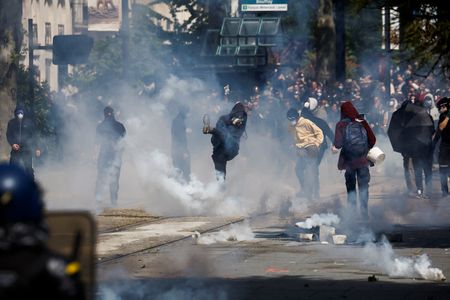 1
1 1
1
By Clotaire Achi and Stephane Mahe
PARIS (Reuters) -French police clashed with hundreds of black-clad anarchists in Paris and other cities during union-led protests against President Emmanuel Macron’s increase in the retirement age, as workers staged Labour Day rallies across Europe.
Demonstrators pelted Paris police with Molotov cocktails and fireworks, torched building materials and smashed up bus stops. Protesters marching peacefully booed the police as they responded with tear gas and baton charges.
Emergency services used water canon to put out a fire which blackened the windows of nearby flats. One officer was badly injured when he was struck by a fiery projectile.
Violence also erupted in Lyon and Nantes, where some vehicles were set ablaze and business premises were trashed. Nearly 200 people were arrested on a day some 782,000 people took to the streets, according to the interior ministry.
Macron last month raised the retirement age by two years to 64 despite multi-sector strikes, in a move that drove his popularity down to near the record lows seen during the “Yellow Vest” crisis of 2018-2019.
The reform has crystallised discontent against a president perceived by many as aloof and indifferent to their daily hardships, and he has been met during walkabouts aimed at rebuilding support by heckling and pot banging.
“They (government) are trying to change the subject quite quickly, but let’s say it’s not working. So much the better!” said sculptor Antoine Eveillo.
Trade unions had called for a big turnout as they seek to force a U-turn by Macron’s government, which forced its pension law through without a final vote in the National Assembly, where it lacks a working majority.
Opinion polls show a substantial majority of French people oppose the higher retirement age.
“The executive cannot govern without the support of its people,” said Sophie Binet, leader of the hard-left CGT union.
‘RETIREMENT BEFORE ARTHRITIS’
Binet said the CGT had not yet decided whether to participate in talks with the government on other labour-related issues such as salaries, working conditions and hardship benefits.
The moderate CFDT union will take part in those discussions, its leader Laurent Berger said.
But Berger also dismissed suggestions that a rare alliance between the leading trade unions was being tested now that the pension bill had been signed into law.
The pension system is a cornerstone of France’s cherished social protection model. A banner reading “Retirement before arthritis!” summed up the disgust felt by many at being told to work longer.
Elsewhere in Europe, Italy’s three main unions rallied in the southern city of Potenza, protesting against a labour package approved by Prime Minister Giorgia Meloni’s rightist government.
During a parade in the Swiss city of Zurich, demonstrators threw water balloons at police and spray-painted properties.
Macron says the French reform is needed to help shore up one of the industrialised world’s most generous pension systems.
French pension payments as a share of pre-retirement earnings are comfortably higher than elsewhere and a French man typically spends longer in retirement than those in other OECD nations.
Retired metalworker Michel Maingy said he felt the battle over pensions was lost. Even so, there were still fights to be won in negotiations over working conditions, he said.
“We need to keep our chins up,” he said ahead of the Nantes protest.
A hardening of the political opposition risks complicating the rest of Macron’s reform agenda, including an employment bill that would require those receiving the minimum welfare benefit to work or get training for 15-20 hours per week.
Fitch cut France’s sovereign credit rating on Friday by one notch to ‘AA-‘, citing the social unrest and potential political deadlock.
(Reporting by Stephane Mahe in Nantes, Clotaire Achi, Matthieu Protard and Richard Lough in Paris, Emma-Victoria Farr in Frankfurt and Alvise Armelli in Rome; Writing by Richard Lough; Editing by Nick Macfie and Gareth Jones)